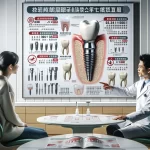Oral health is a vital component of overall wellness, yet it is often underestimated. A healthy, functional smile does more than enhance aesthetics; it plays a crucial role in nutrition, communication, and self-esteem. For individuals facing extensive tooth loss or advanced periodontal disease, achieving optimal oral health can feel like an insurmountable challenge. Enter full-mouth dental implants—specifically Nuvia implants—a transformative solution that can dramatically improve quality of life. This article explores the profound effects of full-mouth reconstruction with Nuvia dental implants, from restoring functionality to enhancing emotional well-being.
The Vital Connection Between Oral Health and Overall Wellness
Maintaining good oral hygiene is essential for overall health and quality of life. Poor oral health can trigger a cascade of systemic issues extending well beyond the mouth. Research has shown that inadequate oral care can contribute to serious conditions such as:
- Heart Disease: Oral bacteria can enter the bloodstream, increasing the risk of heart disease by up to 25%.
- Diabetes Complications: Poor oral health can worsen glycemic control.
- Pregnancy Risks: Gum disease heightens the chances of preterm birth and low birth weight.
- Respiratory Issues: Aspiration of oral bacteria can lead to pneumonia.
- Cognitive Decline: There are links between periodontal disease and increased risks of dementia and Alzheimer’s.
Given these profound associations, prioritizing oral health is vital for maintaining overall wellness.
The Dangers of Periodontal Disease
Periodontal (gum) disease poses a significant threat to overall health. It fuels chronic inflammation and serves as a reservoir for harmful bacteria, creating a ripple effect that impacts various aspects of health:
| Health Condition | Impact of Periodontal Disease |
|---|---|
| Heart Disease & Stroke | Increases risk by up to 25% for heart disease and over 70% for stroke in younger males |
| Diabetes | Worsens glycemic control and vice versa |
| Pregnancy Complications | Heightens risks for preterm birth, low birth weight, and other adverse outcomes |
| Respiratory Diseases | Oral bacteria can be aspirated into the lungs, causing pneumonia |
| Rheumatoid Arthritis | May trigger or exacerbate symptoms in genetically susceptible individuals |
| Osteoporosis | Low bone density affects jawbone health and increases gum disease risk |
These alarming connections underscore the importance of maintaining good oral hygiene.
Life-Changing Benefits of Full Mouth Reconstruction
For those grappling with significant tooth loss or advanced periodontal disease, full-mouth dental implants offer a game-changing solution. Unlike traditional dentures, which can be unstable and uncomfortable, implants are securely anchored into the jawbone, providing a stable foundation for replacement teeth. Nuvia’s advanced system utilizes premium zirconia implants known for their durability and natural aesthetics.
Advantages of Full Mouth Nuvia Dental Implants
The benefits of full mouth Nuvia dental implants are manifold:
- Preserves Bone & Facial Structure: Prevents jawbone deterioration that can lead to facial collapse.
- Stabilizes Adjacent Teeth: Supports nearby natural teeth, preventing premature wear or shifting.
- Restores Bite Force: Allows for confident chewing and biting akin to natural teeth.
- Enhances Nutrition: Improved chewing function aids in better digestion of healthy foods.
- Natural & Long-Lasting: Custom zirconia implants restore smiles for decades.
These comprehensive reconstructions are particularly beneficial for patients with high rates of decay, effectively halting further dental deterioration.
The Path to a Rejuvenated Smile
The process of obtaining full mouth implants unfolds through several key stages:
- Consultation & Candidacy Assessment: A thorough oral exam and 3D scan assess bone health and density. Medical history helps predict healing response. If necessary, grafting may be performed to strengthen the foundation.
- Personalized Implant Placement: After establishing a robust bone matrix, durable zirconia posts are securely drilled into the jawbone, acting as artificial tooth roots that integrate with surrounding bone.
- Healing & Integration: Over 2-6 months, osseointegration occurs as the jawbone fuses with the implants. Swelling subsides and meticulous oral hygiene promotes optimal healing.
- Custom Restorations: Finally, custom abutments and lifelike zirconia crowns or bridges are attached to complete the smile transformation.
While this process requires a significant investment of time and resources, the long-term benefits include a naturally beautiful smile that can last a lifetime with proper care.
Restoring Function – From Chewing to Nutrition and Beyond
The advantages of rebuilt smiles extend far beyond cosmetic enhancement; they restore essential oral functions impacting nutrition and overall health:
- Natural Chewing Function: Securely anchored implants provide necessary biting strength for enjoying various healthy foods.
- Enhanced Digestion & Nutrition: Effective chewing kick-starts digestion and ensures adequate nutrient absorption.
- Improved Speech Clarity: Proper alignment prevents slurred speech, enhancing communication.
- Pain-Free Living: Implants eliminate discomfort associated with ill-fitting dentures.
- Convenience: Daily routines become simpler without cumbersome removable appliances.
Boosting Emotional Well-being and Quality of Life
Beyond tangible oral health benefits, full mouth restorations yield profound emotional and social advantages:
- Increased Confidence: A restored smile enhances self-esteem and encourages social interaction.
- Reduced Anxiety: Concerns about loose dentures or tooth loss diminish, alleviating social anxiety.
- Enhanced Social Comfort: Embarrassment about one’s smile fades away, fostering genuine connections.
- Renewed Vitality: Patients often report feeling rejuvenated with a youthful facial structure.
- Improved Mood: Feelings of depression or isolation frequently decrease following smile restoration.
These psychosocial improvements highlight the immense value of oral health in promoting overall well-being.
Nuvia Full Mouth Implants: The Pinnacle of Smile Restoration
Nuvia dental implants represent the cutting edge of full mouth restorative solutions. Their premium zirconia implants integrate seamlessly with bone and gum tissue while resisting corrosion. Precision-crafted abutments and meticulously designed porcelain crowns complete the natural reconstruction. With diligent home care and regular dental visits, Nuvia smile restorations can function flawlessly for decades.
While considering full mouth implants involves careful evaluation of costs and financing options, they deliver invaluable returns in terms of health, function, and confidence. By showcasing the intimate links between oral and systemic health, Nuvia smile transformations exemplify how exceptional dentistry can profoundly enhance overall well-being.
Costs and Considerations for USA Patients in 2024
For patients in the USA contemplating full mouth Nuvia dental implants in 2024, costs vary based on:
- Extent of tooth loss and periodontal disease
- Need for preliminary procedures like extractions or grafting
- Type of final restorations (crowns or bridges)
- Geographic location
On average, a full mouth reconstruction with Nuvia dental implants ranges from $30,000 to $90,000 or more. While this represents a substantial investment, many dental practices offer financing options to make treatment more accessible.
Choosing a skilled implant dentist who uses premium components like Nuvia zirconia implants is crucial. Look for providers with advanced training in implant dentistry and a proven track record in successful reconstructions.
Additionally, consider the long-term value that dental implants provide; they can last a lifetime with proper care while preserving jawbone health and preventing facial collapse associated with missing teeth.
Conclusion
Full mouth dental implants—especially advanced systems like Nuvia—offer transformative solutions for individuals suffering from extensive tooth loss or advanced periodontal disease. By restoring natural function while enhancing nutrition and self-confidence, these comprehensive treatments significantly improve overall health and quality of life.
While the journey to a revitalized smile requires considerable time and resources, the life-changing benefits make it worthwhile for many. As leaders in modern implant dentistry, Nuvia full mouth restorations demonstrate how skilled care can profoundly enhance wellness and vitality.
For patients considering full mouth reconstruction in 2024, thorough research and careful planning are essential for achieving optimal results. By prioritizing oral health as an integral part of overall well-being, individuals can unlock renewed confidence, comfort, and joy—one radiant smile at a time.
Official Website Links
For more information on Nuvia Dental Implants:
For insights on oral health:
These resources provide valuable information on maintaining good oral hygiene practices that contribute to overall well-being.
How do full mouth Nuvia Dental Implants impact oral health?
Full mouth Nuvia Dental Implants can significantly improve oral health by replacing missing teeth, preventing bone loss, and restoring bite function, which can reduce the risk of further dental issues.
What are the psychological benefits of getting full mouth Nuvia Dental Implants?
The psychological benefits include increased self-esteem and confidence due to the restoration of a natural-looking smile, which can positively impact social interactions and overall quality of life.
Can full mouth Nuvia Dental Implants improve nutrition and digestion?
Yes, full mouth Nuvia Dental Implants can improve nutrition and digestion by restoring the ability to chew a variety of foods properly, leading to better nutrient absorption and overall health.
What is the impact of full mouth Nuvia Dental Implants on speech?
Full mouth Nuvia Dental Implants can improve speech by providing stability and structure to the mouth, which helps in articulating words more clearly and reduces the likelihood of slurring.
How do full mouth Nuvia Dental Implants affect facial structure and aesthetics?
Full mouth Nuvia Dental Implants help maintain the natural shape of the face by supporting the jawbone and preventing bone deterioration, which can enhance facial aesthetics and prevent premature aging.







